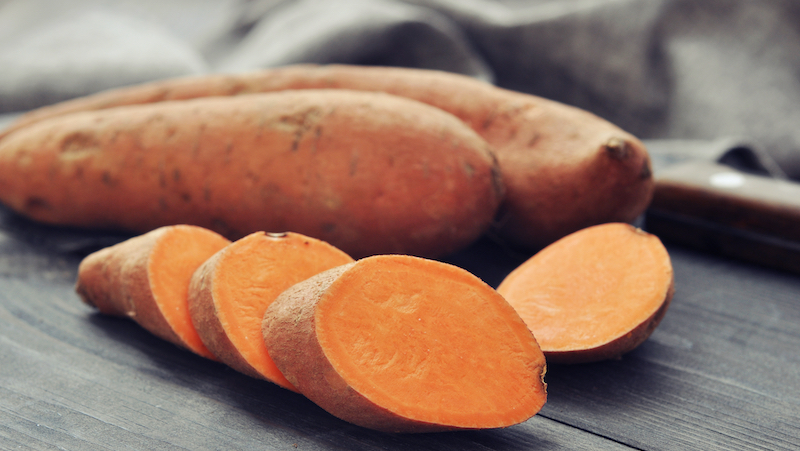7 Health Benefits of Sweet Potatoes
As a side dish or ingredient in soups, stews, and more, these root veggies are packed with goodness

These root vegetables have an undeserved reputation for being bad for you. Sure, when loaded with brown sugar, butter, and marshmallows, they may have some unhealthy attributes. But go easy on the bad-for-you toppings and you will realize the health benefits of sweet potatoes are amazing. We explain just how amazing.
Many people wonder if sweet potatoes are actually that good for you, which isn’t surprising considering their very name suggests they’re sugar-and-starch bombs! But this root veggie is actually super good for you. Sweet potatoes are particularly appealing in the fall – as a hearty side dish and as an ingredient in everything from soups and stews to pies and other desserts.
The colorful gems offer some pretty impressive health perks. Here are seven benefits of sweet potatoes, along with some simple ways to healthfully incorporate sweet potatoes into your everyday meals, snacks, and treats.
1. They’re a good source of vitamins C and A.
One cup of baked sweet potato provides nearly half of your daily vitamin C needs. The same portion also supplies 400%(!) of your recommended daily intake of vitamin A. Both nutrients are vital for supporting immune function, which is especially important during cold and flu season. Vitamin A is also key for maintaining healthy skin, vision, and organ function.
2. They provide lots of other nutrients, too.
A serving of sweet potato delivers a third of your need for manganese, a mineral that helps produce collagen and promote skin and bone health. You’ll also get between 15% and 30% of several energy-supporting B vitamins and minerals, including potassium (more on this below).
3. Sweet potatoes are antioxidant powerhouses.
Vitamins A and C also function as antioxidants that protect cells against aging and disease. For even more antioxidants, choose purple sweet potatoes. The pigment that gives them their gorgeous hue has particularly potent antioxidant properties.
4. They’re anti-inflammatory.
We’ve long known that unchecked, low-grade inflammation raises the risk of nearly every chronic disease, including obesity, type 2 diabetes, heart disease, and cancer. Natural anti-inflammatory compounds in sweet potatoes have been shown to quell inflammation at the cellular level: Research done on animals has shown reduced inflammation in brain tissue and nerve tissue after purple sweet potato extract consumption.
Try this recipe: Sweet Potato and Swiss Chard Gratin
5. They don’t cause blood sugar spikes.
Some may regard sweet potatoes as too starchy, but their high fiber content makes them a slow-burning starch – meaning they won’t spike blood sugar and insulin levels. One cup of baked sweet potato provides about 6 grams of fiber, which is about a quarter of the daily recommended minimum.
6. Sweet potatoes help regulate blood pressure.
One cup of sweet potato baked in its skin provides 950 milligrams of potassium. That’s more than twice the amount in a medium banana. Potassium essentially sweeps excess sodium and fluid out of the body, which lowers blood pressure and reduces strain on the heart. Potassium also helps regulate heart rhythm and muscle contractions. According to the National Health and Nutrition Examination Survey, less than 2% of Americans meet the daily recommended potassium target of 4,700 mg.
7. They may help support weight loss.
A sweet potato at 100 grams contains 86 calories, 1.6 grams of protein, 3 grams of fiber, 0.1 grams of fat, and 20.1 grams of carbohydrates, numbers collected on Health Canal. That means it’s a wise choice for weight loss.
About 12% of the starch in sweet potatoes is resistant starch, a filling, fiber-like substance your body doesn’t digest and absorb. One study found that replacing just 5.4% of total carbohydrate intake with resistant starch resulted in a 20 to 30% increase in fat burning after a meal. Resistant starch also prompts the body to pump out more satiety-inducing hormones.
Health delivers relevant information in clear, jargon-free language that puts health into context in peoples’ lives. Online at www.health.com.
© 2021 Meredith Corporation. Distributed by Tribune Content Agency, LLC.
Article updates: Italicized copy added on Jan. 12, 2022


